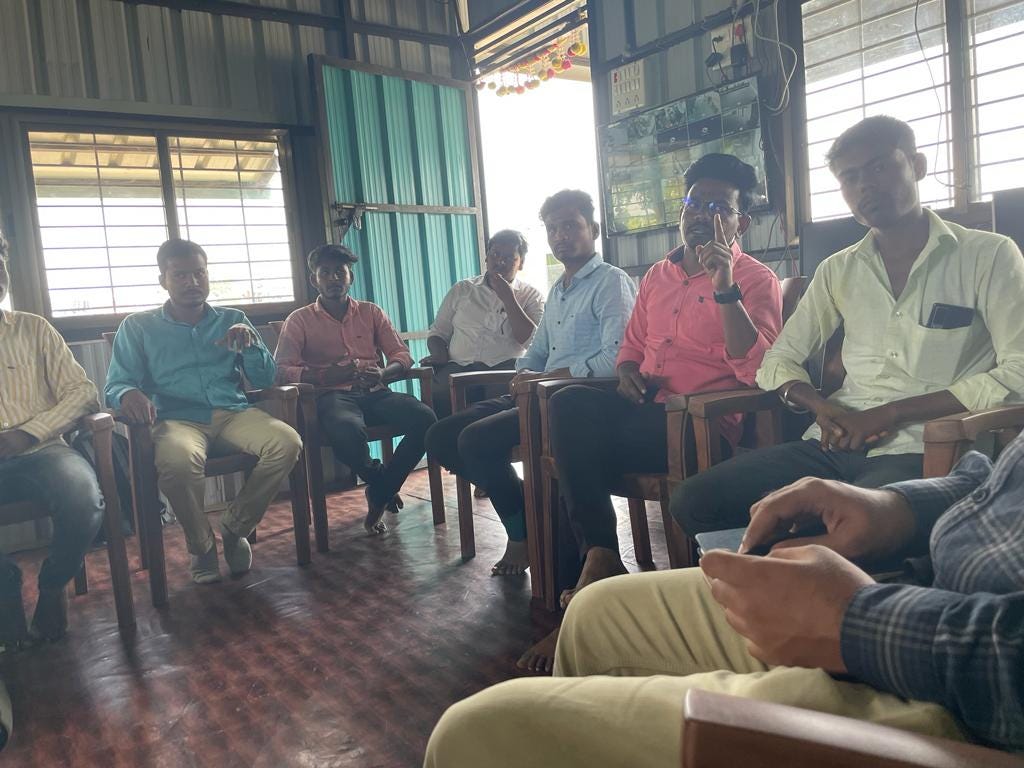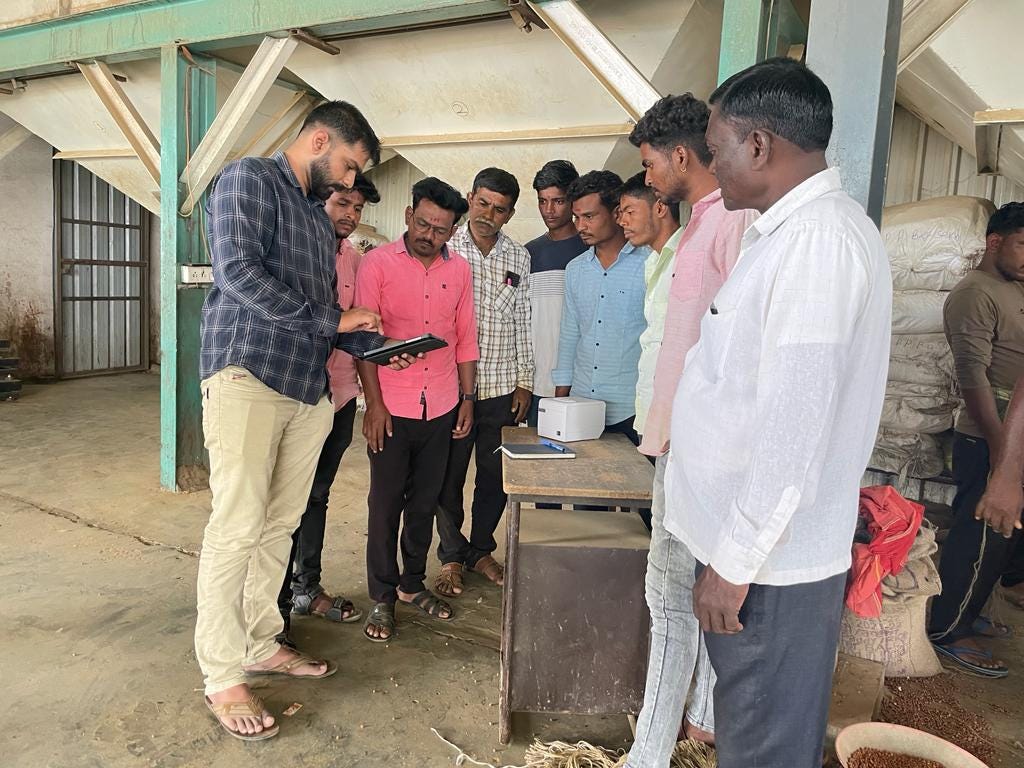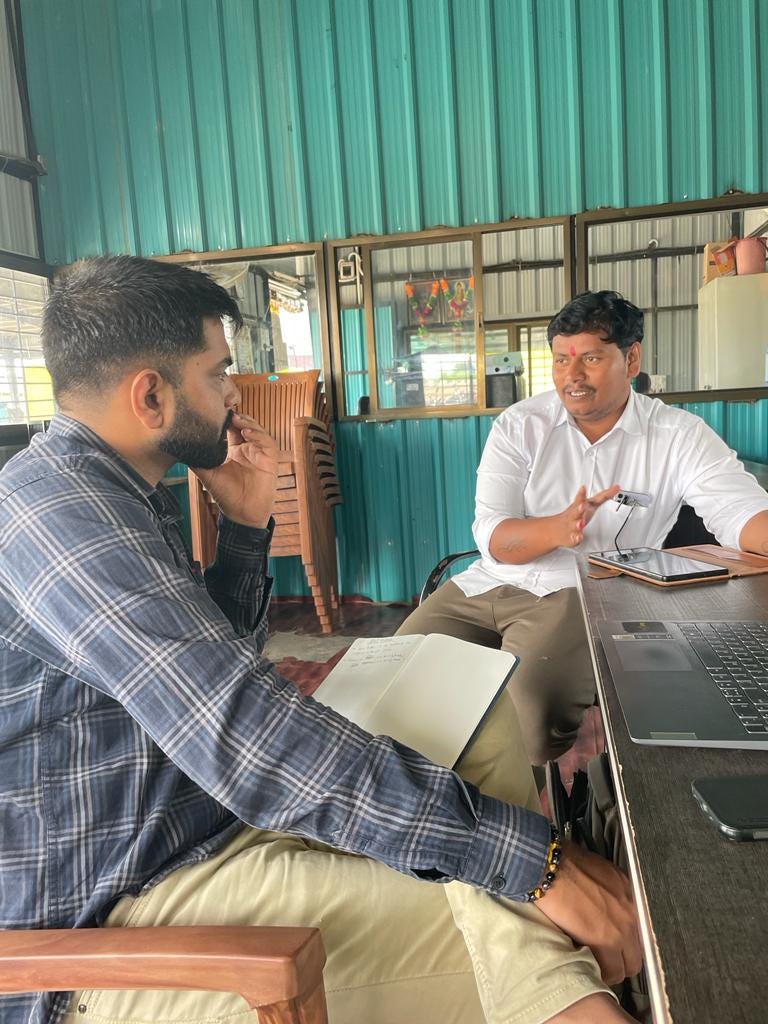Transforming Agri-Trade
A silent digital revolution is sweeping the spot agri-commodity markets in India.
Agri-commodity Trade in India
One of the last sectors to be disrupted by digitalisation in India is the agricultural sector. Change is generally slow in agriculture and often comes with a steep learning curve for farmers and traders alike.
While the on-farm piece of technology is still being refined, the agri-trade has seen rapid digitalisation. Before delving into the changes, it is important to understand the challenges of agri-commodity traders.
Challenges to Agri-trading
The following structural challenges pose significant risks to the very viability of agri-trade:
Manual Operations: Many agri-trade companies rely heavily on manual, paper-pen processes. While computers and accounting software are already adopted by these firms, many farmer-facing transactional processes are manual and disjointed. Because there’s no seamless connectivity between these processes, end-to-end traceability is missing. The trading staff have to spend countless hours to reconcile all trades after the closing. This leads to poor business decision-making besides making the data entries prone to error.
Seasonality: On the demand side, certain commodities exhibit seasonality owing to either their harvest time, the market demand or both. This means a year-round market isn’t available for such commodities.
Weather: Climate change is a reality and the sector most affected by it is agriculture. Inclement weather directly impacts sowing/planting and harvesting operations besides affecting the standing crops at various growth stages. Any supply-side decrease owing to such losses adds to market uncertainty impacting the agri-commodity business.
Government regulation: Supply-side challenges lead to the shortfall and contribute to an increase in food prices and consequently food inflation. These challenges arise due to climate-linked crop damage. Paying more for the same or even lesser quantity of agri-produce directly affects the savings of the population. Thus, governments resort to remedial measures like export bans, additional tariffs or price caps. This has a direct bearing on the viability of agri-trade businesses.
Cartelisation: Scrupulous traders are known to create artificial scarcity by hoarding the agri-produce in the hopes of selling at higher rates later. This impacts the market dynamics and end-consumers negatively. This is where the government often steps in with more regulation making the trade more bureaucratic.
Quality: Quality is a function of prevalent weather and soil conditions, crop management, growing practices and the use of agro-chemicals to a great extent. These factors directly impact quality and consequently, the market rates. While agri-produce for export is often “grown to spec”, the same isn’t always the case for domestic the market.
Presently, a universal and standardised parametric quality model is missing in the market. Thus, pricing comes down to negotiations and haggling rather than robust quality assessments.
What is SetuTrade?
To address the aforementioned challenges, FarmSetu has developed SetuTrade, a software product that aims to transform small and medium agri-commodity trading operations.
Built by agri-professionals with years of experience in the agriculture technology space, SetuTrade is a SaaS product that can be quickly implemented in any agri-trading business in a few hours.
Designed as an “over-the-counter (OTC) trading terminal”, SetuTrade comprises an Android app loaded on a tablet which is connected to a thermal printer. This trading terminal is placed at the procurement desks of the agri-commodity traders who buy the produce from farmers.
The SetuTrade terminal captures all the vital details essential for a successful trade. This includes the farmer’s contact details, farmer profile, crop data etc. The daily market rates for specific commodities can be easily entered against benchmarked quality parameters. Against the benchmarks, actual quality parameters are noted which in turn determine the final rate offered to the farmer.
SetuTrade in turn can be integrated with the existing accounting software systems of agri-commodity traders. This enables real-time connectivity between the procurement function and the accounting function. This is of tremendous value to the business owner who can easily check the live dashboard to understand the actual trade volume and the financial transactions thereof. This helps in planning cashflows and bank financing.
How does SetuTrade transform Agri-Trade?
Digitisation: Experience end-to-end and seamless digitisation by converting manual processes into fully automatic workflows
Paperless: While we provide a printer to print and hand over the trade receipts to farmers, the same receipts can also be delivered to farmers through our app.
Farmer onboarding: A trading house can consolidate its farmers by onboarding their primary data on SetuTrade. It can easily notify farmers affiliated with it of the day’s rates, any service notifications, government mandates, agri-news etc. Farmers can receive digital trade receipts and view the historical and current trade ledger and associated trade details.
Productivity: SetuTrade fully digitises each trade thus reducing the total duration per trade. With an intuitive, bold interface, the transaction errors are also greatly reduced thus bringing in the much-needed gains in productivity and accuracy.
Transparency: All transactions are secured end-to-end and time-stamped. Thus, there’s total transparency on whether and when a particular transaction has happened and whether it was fully executed or not.
Past data: Historical transactions are mapped to individual commodities and farmers. As and when required, any single transaction or a group of transactions can be pulled up for further analysis and action.
Integration: SetuTrade can be easily integrated with most of the widely used accounting software. We currently offer integrations for Tally and SAP in India. We also help integrate a variety of weighing scales and printers making SetuTrade a highly modularised system
How does SetuTrade benefit farmers?
Access: On-demand access to the latest market rates, news and updates, trade and payment statuses and trade receipts
Tracking: Fully updated trade ledger with historical transactions, payment status and reports of all the trades executed
Transparency: Check accepted and rejected trades, payments made and quality reports for each transaction
Farmers will develop more confidence and trust in the buyer using the SetuFarm app. Once farmers experience firsthand the transparency and end-to-end visibility of their business relationship with the agri-trader, their association automatically deepens.
What makes SetuTrade unique?
SetuTrade is built with farmers’ collectives like FPOs in mind. It is built to serve as a secure, authentic channel between the farmers and the agri-trade. The downstream piece of the agrifood supply chain is fairly established. Where SetuTrade makes a difference is by enabling upstream to midstream traceability. This is the segment which is fairly data-dark at the moment and ripe for digital disruption.
With one seamless software connecting farmers with the agri-trading enterprise, we offer the technology backbone for effective backward and forward integration.
Implementation
What sets us apart is our maniacal focus on implementation. Our experience of over a decade has shown that after the initial euphoria, the usage of the technology solutions plateaus at first and then drops off. This leads to wasted time, efforts, investments and transformation opportunities.
We sat down with our client’s team and understood their user personae to get an idea of the end-users we were dealing with. Next, we made them pain-aware. Until we pointed out, they were okay with their semi-automatic or even manual business processes.
We closely observed the users’ day-to-day work and found many areas of improvement that SetuTrade could immediately address via configurations and integrations to SetuTrade. The users had their set of expectations which we fulfilled through specific product features.
Many agri-enterprises do not have dedicated technology professionals in the teams. We therefore decided to play that role proactively. Besides helping our client choose the right hardware, our team was there to implement the system, conduct user acceptance trials and train the users.
We also experienced some cynicism from the end-users due to their past negative experiences with technology systems they tried implementing earlier.
We focussed on training the end-users to tackle every possible scenario. Once SetuTrade went live, we closely monitored its working and deployed resources to immediately address any problems the users may encounter. Besides telephonic support, we also made available remote access-based support to resolve any niggling errors that may creep in.
The final challenge was to help integrate SetuTrade with their accounting system. This integration helped eliminate any overlapping processes or repetitive work. Each transaction recorded on SetuTrade was passed on to their accounting system which in turn ensured that hundred per cent of the trades were captured with total accuracy in real-time.
Once the client’s team gained confidence, we sought feedback every fortnight. With this level of engagement, we succeeded in delivering speed and accuracy of transactions - which was a prerequisite to scaling and our core deliverable.
The duration per transaction dropped by roughly 40%
The incidence of erroneous transaction recording dropped by 80%
Complementary tools like SetuCare, SetuSchool and SetuAdvice that drive farmer engagement are baked into the product right from Day One. These tools help deepen the farmer-trader connection because, in the absence of these tools, the relationship is too short-term and transactional.
In Maharashtra, we have digitally transformed Hingoli-based Dattaguru Farmers Producer Co. Ltd. with SetuTrade. The future for agri-commodity trading is here. SetuTrade is the future of agri-trade.
Talk to us today to explore how we can transform your agri-procurement operation into a digital, lean and globally competitive agri-enterprise.















